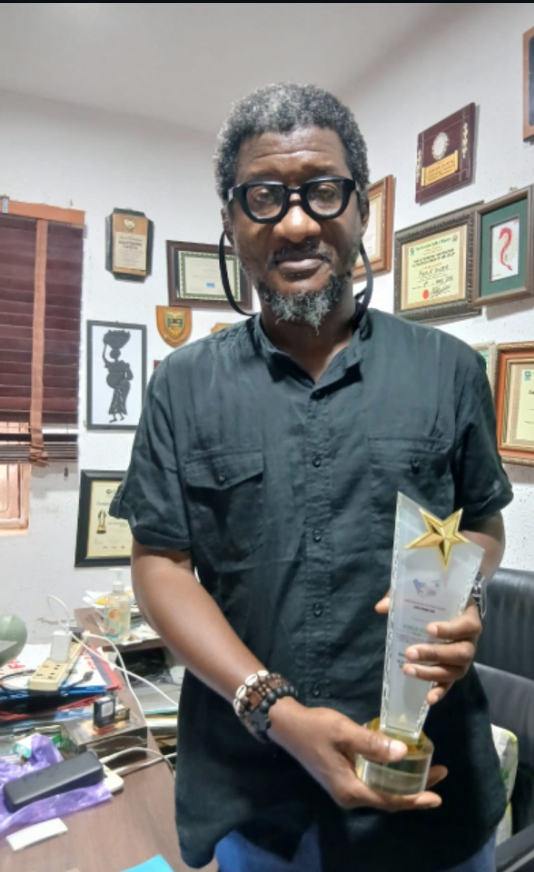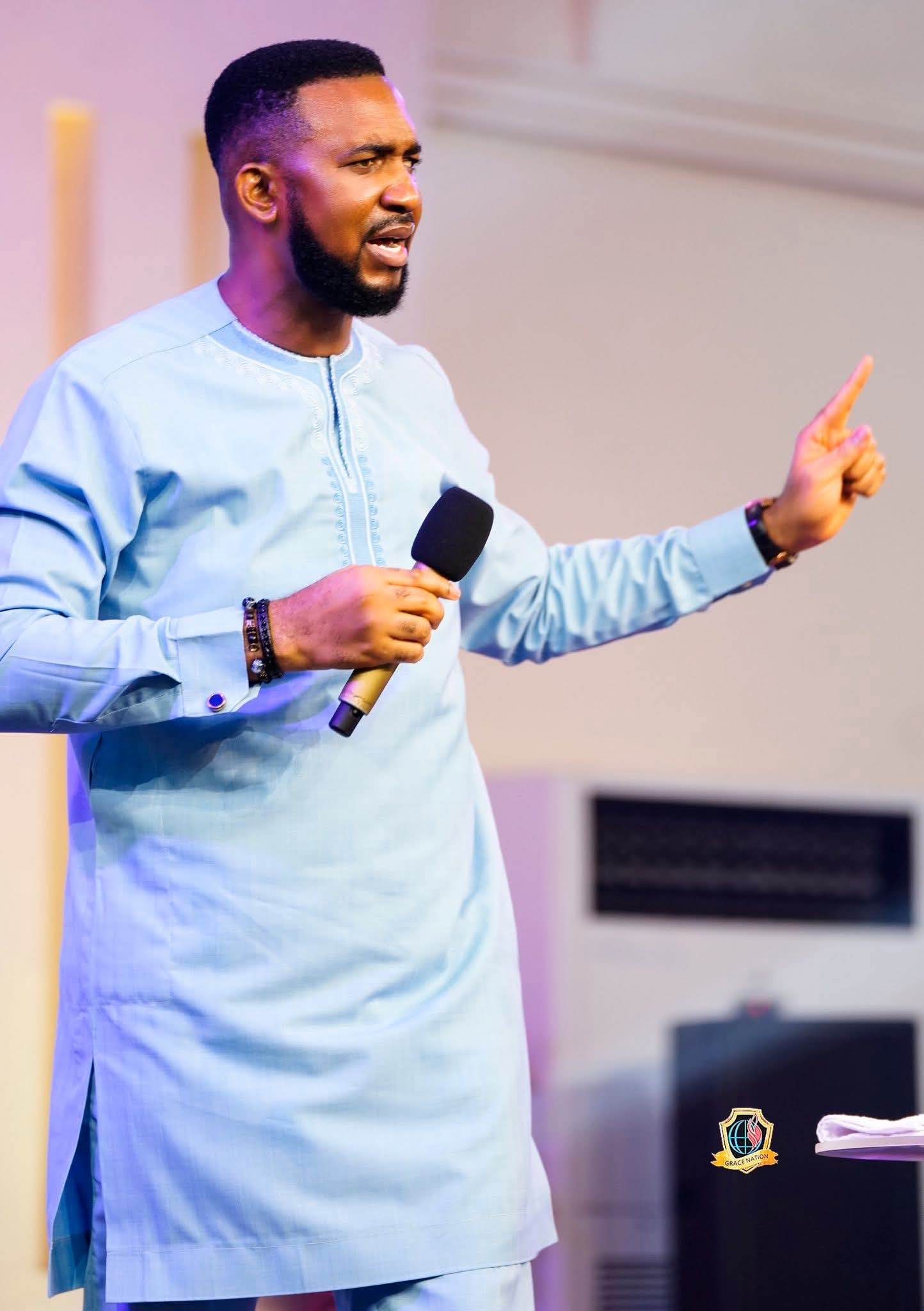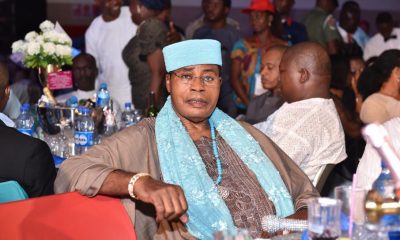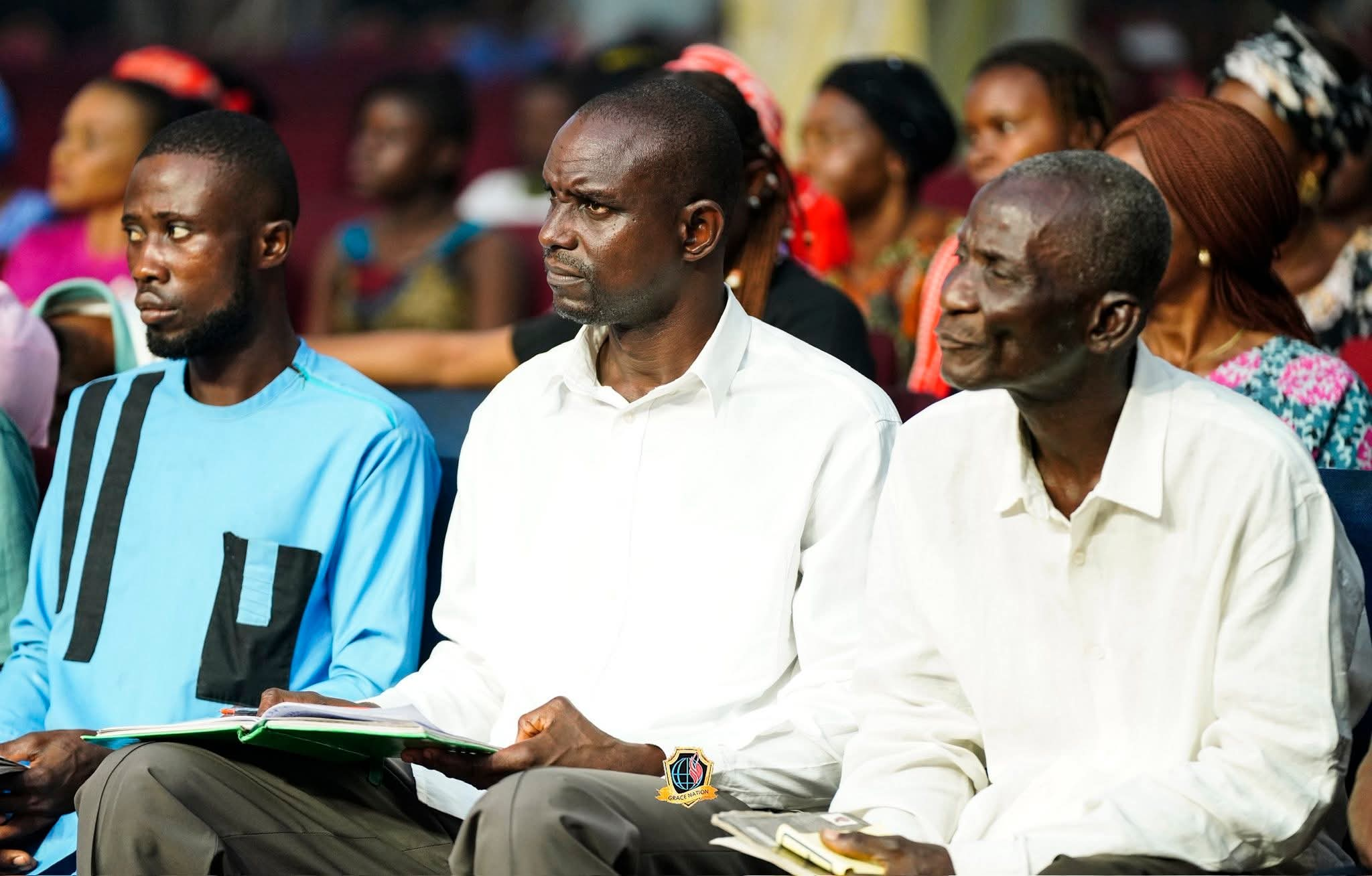celebrity radar - gossips
Monarch Marks Anniversary With Message Of Unity Necessary To Beat COVID-19 – Oba Semiudeen Orimadegun Kasali

As the COVID-19 pandemic continues to take its toll on businesses and lives in general, His Royal Majesty, Oba Semiudeen Orimadegun Kasali, Emugoriade 1, the Adeboruwa of Igbogbo Kingdom, assured his people that it is a phase that will pass.
In a message to mark his fourth anniversary as ruler of Igbogbo Kingdom, Oba Semiudeen, stated that in order to stem the COVID-19 pandemic, people need to be united in adhering to the laid down directives by the government and the health bodies.
According to the monarch, beyond the effort of the government, the people need to observe social distancing, proper hygiene practices, abstain from public gathering, and other such regulations.
“The palace understands the toll the COVID-19 pandemic has taken on businesses, and the way of life of people, that is why we are with them during this time of dire need.”
“It is at a time like this I urge all Nigerians to remain united in their day-to-day dealings with one another, irrespective of tribe or religion. Together we can defeat this pandemic and have things return to normalcy,” he said.
Kabiyesi seized the opportunity to commiserate with families of Late Sen. Adebayo Sikiru Osinowo, Senator, Lagos East Senatorial District and other people that might have lost their beloved ones during this trying period.
The Oba also called on the Federal Government, Lagos State Government and appropriate agencies to take the security of lives and property serious, especially as it relates to his community.
According to him, there is no better time to come together to stem the prevailing incidents of cult related violence and other forms of insecurity than now. The cultists must be treated as ‘common enemies’ to themselves and the future of our great Igbogbo Kingdom.
He further drew the plight of the government to the state of roads in the community, stating that adequate infrastructure is necessary in ensuring a viable economy and discourage urban migration.
“Other issues I would like to draw the attention of the government to include that of flooding and how it threatens the lives of my people, as well as the delay in compensating people of Igbogbo Kingdom whose houses were demolished to pave ways for road construction.”
“It is enough pain to lose ones ancestral home(s) for the development of our kingdom. It is more disheartening to wait endlessly for compensation that is meant to resettle the heroes/heroines of this noble sacrifice.”
While thanking the Governor of Lagos State, Mr Babajide Olusola Sanwo-Olu and his deputy, Dr Olufemi Hamzat for their unalloyed support, Oba Semiudeen also used the opportunity to remind Mr Governor of the compensation for his people.
“My sincere appreciation goes to the Ijaolu family, the council of Obas, my traditional and honourary Chiefs, Baales of communities, iyaloja/babaloja, religious bodies, as well as the Chairman and great staff of Igbogbo Bayeku Local Government for the support they have shown me these past four years.”
“My gratitude will lack substance if I don’t specially recognize the elected representatives, political actors and community developers that have been of immense support to the throne.”
“I would also like to call on the sons and daughters of Igbogbo as well as the Lagos State Government to come together to ensure the rapid development of the Kingdom,” he added.
While appealing to religious bodies to continue praying for the defeat of the pandemic which has prevented believers from observing prayers in different places of worship, Adeboruwa also commended frontline health workers.
“It is also of great importance that I acknowledge sacrifices made by religious leaders and their congregants that have been unable to worship since the breakout of the COVID 19 pandemic. Also, the Olombas.
“These people have been unable to celebrate important festivals due to the physical distance measure as stipulated by COVID 19 protocols. I enjoin them to keep praying for the world to overcome the challenges.”
“I also want to identify with our frontline workers in the State ably led by the Commissioner for Health, Prof. Akin Abayomi. Their commitments and dedication to duty made it possible for the state to effectively manage the pandemic at great risk to their own health” Kabiyesi said.
“As we gradually approach Ileya celebration, I wish Muslim community a happy celebration and enjoin them to observe the sallah in peace and harmony.”
“They should reflect on the importance of the celebration and pray for the country and its leaders. It is also important that they should adhere strictly to whatever directive that may be issued by the government in this regard.” he said.
Born October 20, 1968, in Lagos, Oba Semiudeen Orimadegun Kasali studied Law at the University of Ibadan and graduated in 1997. He thereafter proceeded to the Nigerian Law School and was among the last batch in Lagos, before the opening of the Abuja campus. He equally bagged his LLM from the prestigious Obafemi Awolowo University, Ife.
He joined the Pinheiro & Oguntade Law Firm between 1999 and 2000.
Oba Semiudeen took personal interest in International Relations and Politics and was very much in love with Political Science and International Relations.
The ruling house, Ijaolu, presented him as its candidate for the stool of Igbogbo Kingdom in June 2015 amongst the three applicants who made the final list.
Oba Semiudeen voluntarily retired his appointment in the Lagos State Civil Service, Ministry of Justice as a Chief State Counsel, Level14 Officer with work experience spanning fifteen years of selfless and meritorious service.
He is married to Olori Sekinat Omolara Kasali and Olori Kafayat Omobolanle Kasali and is blessed with children.
Signed:
Steven Anu’ AdesemoyeMedia & Publicity Consultant to Adeboruwa of igbogbo Kingdom
celebrity radar - gossips
Another Feather for Nollywood Icon Fidelis Duker

**Another Feather for Nollywood Icon Fidelis Duker
*Lagos, Nigeria* — In a remarkable celebration of artistic achievement, renowned Nollywood figure Fidelis Duker received yet another prestigious accolade last weekend, solidifying his role as a key player in the growth of the Nigerian and African film industries. The award was presented in a ceremony held at Duker’s Lagos office by esteemed film and theatre director, Mr. Alex Eyengho, founder of the Warri International Film Festival, alongside Marketing and Strategy Director, Mrs. Matel Eyengho.
The recent recognition builds upon Duker’s previous achievement at last year’s ECOFEST in Dakar, where he was honored with a Lifetime Achievement Award. This latest accolade is a testament to his unwavering dedication and substantial contributions to the cinematic landscape.
“I am truly humbled by this recognition,” Duker expressed during the event. In his speech, Alex Eyengho lauded Duker’s pioneering efforts in establishing significant film festivals in Nigeria, particularly the Abuja International Film Festival, which has played a vital role in promoting local talent and storytelling.
Eyengho emphasized, “Fidelis has not only paved the way for emerging filmmakers but has also helped elevate Nigerian cinema on the global stage. His creative vision and commitment inspire all of us in the industry.”
As Duker reflects on this honor, he acknowledges the importance of teamwork and collaboration in achieving success. “This acknowledgment reaffirms to my team and me that our work is being observed, and it motivates us to continue contributing to the development of our sector,” he stated.
With numerous projects on the horizon, Duker remains a relentless advocate for the growth and recognition of African cinema. His latest recognition is yet another testament to the vibrant and evolving landscape of Nollywood, as industry leaders like him continue to inspire future generations.
As the film industry anticipates the next phase of development, Duker’s continued influence signals a promising future for filmmakers in Nigeria and across the continent.
celebrity radar - gossips
E‑Money’s Grand Gesture: A Closer Look at the SUV Gift to Chinedu “Aki” Ikedieze

E‑Money’s Grand Gesture: A Closer Look at the SUV Gift to Chinedu “Aki” Ikedieze
By George Omagbemi Sylvester | Published by SaharaWeeklyNG
“Public Generosity, Celebrity Loyalty and the Symbolism of Wealth in Nigeria’s Entertainment Elite.”
On Tuesday, February 17, 2026, Nigerian billionaire and entrepreneur Emeka Okonkwo, widely known as E‑Money, once again captured national attention with a lavish and highly publicised act of generosity, gifting a brand‑new 2024/2025 Ford SUV to veteran Nollywood actor Chinedu Ikedieze, affectionately called Aki, during his high‑profile birthday celebration.
The event, held in Lagos amidst a constellation of entertainers, business figures and socialites, was itself part of an annual tradition in which E‑Money marks his birthday (on February 18) with large‑scale giveaways and spectacular shows of material philanthropy. This year, he announced the gift of over 30 cars to friends, staff and family, a gesture that quickly went viral as videos and images circulated across social media platforms.
In the case of Ikedieze, E‑Money’s gift appeared to be deeply personal. During the festivities, E‑Money stood beside his elder brother, Grammy‑nominated musician KCee and recounted how Ikedieze stood by him at his 2007 wedding. The billionaire explained that the SUV was a “token of appreciation” for the enduring support the actor had shown over the years which is a narrative that blends friendship with public celebration.
Ikedieze, a Nollywood staple with a career spanning more than two decades and over 150 film credits, including the iconic Aki na Ukwa franchise, visibly reacted with humble surprise as he received the vehicle, bowing his head in respect and gratitude. The actor later shared the moment on his Instagram account with a caption celebrating the gift, further fuelling online engagement around the event.
Beyond the spectacle, this incident underscores evolving dynamics in Nigerian celebrity culture and the intersection of wealth, influence and reciprocity. Sociologist Dr. Chinedum Uche of the University of Lagos, speaking on the broader implications of such high‑profile gifts, notes: “Philanthropy that is highly publicised can reinforce social bonds, but it also reflects a culture where generosity is intertwined with reputation economy; where giving becomes as much a social signal as it is an act of kindness.” The quote highlights how public acts of wealth transfer among elites serve layered social functions that extend beyond pure altruism.
Critics of such displays argue that ostentatious giveaways, particularly in a country with stark economic disparities, risk amplifying social envy and exacerbating perceptions of inequality. Economist Dr. Ifunanya Nwosu from the Lagos Business School observes: “In societies marked by economic stratification, celebrity largesse may inspire admiration, but it can also inadvertently highlight structural inequities; prompting questions about systemic investment in public welfare versus individual generosity.”
Still, supporters maintain that E‑Money’s annual tradition (which has in past years included cash gifts to his brother KCee, comedians and even domestic staff) reflects genuine gratitude and a commitment to uplifting his immediate circle, albeit within the private sphere.
For Ikedieze, the SUV stands both as a heartfelt gesture from a longtime friend and a public affirmation of their enduring relationship. As the video of the moment continues to circulate, the broader narrative has ignited discussions about the role of private wealth in public life, celebrity culture and how acts of giving are interpreted in contemporary Nigerian society.
In a landscape where influence and generosity often play out in equal measure on public stages, E‑Money’s gift to Aki is more than a headline, it is a flashpoint in ongoing debates about wealth, friendship and visibility in Nigeria’s entertainment and entrepreneurial ecosystem.
celebrity radar - gossips
Spiritual Reality: Wicked People Are Possessed by Wicked Spirits — Dr. Christian Okafor

Spiritual Reality: Wicked People Are
Possessed by Wicked Spirits — Dr. Christian Okafor
…..“You don’t need to offend them before they attack you.”
…..“Your only true help comes from God.”
Demons are strategic and calculating. They detect threats quickly and position themselves to resist any power that may expose or overpower them.
According to the Generational Prophet and Senior Pastor of Grace Nation Global, Christian Okafor, spiritual intelligence operates both in light and in darkness—and believers must understand this reality.
Dr. Okafor delivered this message on Thursday, February 19, 2026, during the midweek Prophetic, Healing, Deliverance and Solutions Service (PHDS) held at the international headquarters of Grace Nation Worldwide in Ojodu Berger, Lagos, Nigeria.
The Operations of Demons
Teaching on the subject “Spiritual Reality” with the subtitle “Operations of Demons,” the Man of God explained that when demons possess individuals, their behavior changes. Such people may attack, bully, or resist those sent by God to help them, unknowingly rejecting divine assistance and prolonging their struggles.
“You don’t need to offend a demon before it attacks you,” he said. “What you carry is enough to provoke opposition. The greater your potential, the greater the battle.”
Dr. Okafor noted that many believers misinterpret battles as signs that God has abandoned them. However, he explained that some battles are permitted for growth, training, and divine glorification.
According to him, God may allow certain confrontations so that believers understand spiritual warfare and emerge stronger.
“Some battles are necessary,” he emphasized. “They push you into your turning point.”
He further stated that God does not respond to lies, blackmail, or bullying. He responds to His Word. Therefore, opposition is not proof of God’s absence, but often evidence of destiny at work.
The Weapon Against Demonic Attacks
Addressing solutions, Dr. Okafor described prayer as the strongest weapon against satanic operations.
“Prayer is the license that invites God into your battles,” he declared. “God does not intrude—He responds to invitation.”
According to the Apostle of Altars, understanding the principles and discipline of prayer enables believers to receive divine strategies for overcoming demonic resistance. Without prayer, he warned, spiritual help cannot be activated.
“You cannot receive help without God,” he concluded. “And you cannot engage God without prayer.”
Manifestations at the Service
The midweek gathering was marked by a strong move of the Spirit, with testimonies of deliverance, miracles, restoration, and solutions to various challenges presented before God. Several individuals reportedly committed their lives to Christ during the service.
-

 celebrity radar - gossips6 months ago
celebrity radar - gossips6 months agoWhy Babangida’s Hilltop Home Became Nigeria’s Political “Mecca”
-

 society6 months ago
society6 months agoPower is a Loan, Not a Possession: The Sacred Duty of Planting People
-

 society5 months ago
society5 months agoReligion: Africa’s Oldest Weapon of Enslavement and the Forgotten Truth
-

 news6 months ago
news6 months agoTHE APPOINTMENT OF WASIU AYINDE BY THE FEDERAL GOVERNMENT AS AN AMBASSADOR SOUNDS EMBARRASSING








